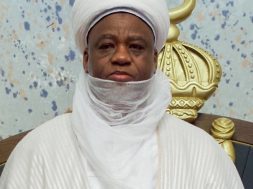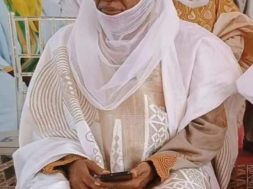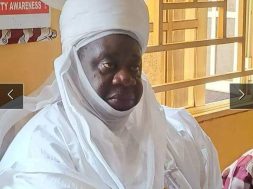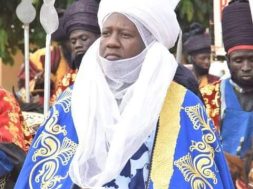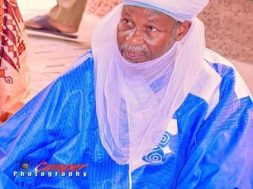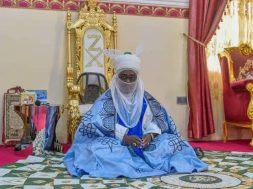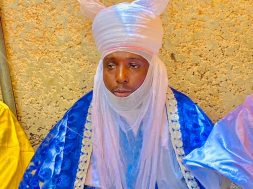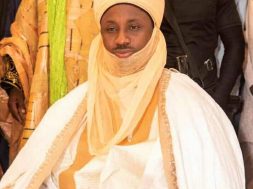
Kano Emirate Coronation Lecture, Day 1 – 1st July 2021
Kano Emirate: Yesterday, Today and Tomorrow by Prof. Abdallah Uba Adamu
The immediate past vice chancellor of National Open University, NOUN.
By Muh’d Dahiru Lawal

Professor Abdallah Uba Adamu stated, no northern Nigerian Emirate has the spectacular and expansive history and cultural anthropology like the emirate, now emirates, of old Kano.
He made the assertion at the Coronation lecture delivered on the occasion of the coronation of his Royal Highness, Alhaji (Dr.) Aminu Ado Bayero, the 15th Fulani Emir of Kano on Thursday 1st July, 2021 at the Bayero University Kano (BUK) Convocation Arena.
Professor Abdallah who is now domiciling at the Faculty of Communication, Department of Information and Media Studies, BUK, said what makes Kano Emirate the most unique and long-standing Emirate in the country are its inherent historiography coupled with its ability to absorb and merge individual national and transglobal identities into a singular “Kananci” cultural identity.
Adamu, who is a double professor in science education and Media Studies, noted that the state of Kano would for a long time to come continue to lead in the admiration of others for its rich cultural heritage and unique way of doing things not only in Nigeria, but in a global arena.
Taking the gathering through the city’s rich and enchanting history, Professor Adamu gave the background to the historical evolution of the Emirate and its spectacular contribution to the socio-cultural, economic, and political development of Nigeria in particular and the West African colonies, in general.
“The Kano Emirates having evolved over one thousand years has undergone tremendous transformation in all aspects of its development.
“By 2021, Kano has retained its lead as innovatory Emirate incorporating, as it does, not only all the antecedent structures outlined, but also capping it with total acceptance, expansion and development of new ones,” the University don stated.
He further argued that both the city, the Emirate and its traditional institutions have immensely benefitted from relative structural and narrative stability, thus, making Kano the most unique Emirate in the country.
Tracing the history of Kano as a ritual city, Adamu disclosed that the earlier settlers of the city lived at Dala near water ways of Jakara River in which they developed a religious fixation of paying tributes to the spirits of the river.
“For the next hundreds of years, they established a vibrant community with various trade guilds networked around the hill and close to the nearby lush forest (Kurmi), giving rise to Kurmi market. Thus if Kano is considered a commercial emporium, it is because it deserved it.”
However, the arrival of Bagauda sometimes in 999AD turned the small settlement to a more organized administrative city, thus, providing an organized leadership which they hitherto lacked. This paved the way for the beginning of the Emiral system in the city.
“Bagauda’s arrival marked the first stage of the transformation of the community by creating a ruling house that was to last to 1807 with the Jihad of Usman Dan Fodio. The merchants, hunters and farmers who now formed the community were apparently happy to have organized leadership to guide them, while allowing them to continue with their commercial activities.”
He noted that like ritual cities, administrative cities were theb habitation of the state rulers and although Bagauda did not rule the territory from Kano city, he nevertheless left a garrison presence which administered the city on his behalf.
Professor Abdallah went further to explain the various transformations of Kano as a mercantile city, a scholastic city, a colonial city, an industrial city and now a bustling media hub.
“The growing reputation of Kano as a powerful Kingdom served to attract traders and merchants from states and cities as far away as the Maghrib and so Kano became the first trans-Saharan terminus through which people exchanged goods and services across the continent to the north,” he submitted, pointing out that the arrival of Islam in the 14th century, coming in the company of a full contingent of traders, served to entrench the mercantile features of the city.
He argues that Kano owes its emergence as a scholastic city to the eddy of scholars and merchants which set a trend that eventually created a city with significant focus on learning. Leading in this development of Kano were the Wangarawa merchant clerics under the leadership of Abdulrahman Zait.
“The Wangarawa clerics were actually on their way to Makkah. On passing through the Hausa land, they were persuaded to stay in various urban clusters to establish schools. And although they made Kano their permanent home – rich, prosperous and protected as it was then – their main mission of spreading literacy was maintained.”
The British conquest of Kano in 1903 saw the transition of the city into a colonial city. They introduced colonial political institutions including an education system fashioned along their own conception of knowledge.
The establishment of the Township administration in Kano and large-scale importation of West African nationals into Kano, as well as large numbers of southern Nigerian – all group at cultural variance with the indigenous population, which necessitated the establishment of Sabon Gari, characterized the colonial city, and their heterogeneity truly reflects what can be called urban city.
He then elaborated on the industrialization of Kano which he said started with the cottage industries, mainly carried out in homes and local community clusters.
“The influx of north African traders generated a new food industry revolving around north African Arab delicacies in baking and confectionaries that became eventually domesticated as Hausa food.”
He noted that Kano as a bustling media hub having evolved over one thousand years has undergone tremendous transformation in all aspect of its development.
“By 2021, Kano has retained its lead as innovatory emirate incorporating, as it does, not only the antecedent structures outlined, but also capping it with total acceptance, expansion and development of new ones, including new media.”
While making his remarks, the Sultan of Sokoto, Muhammad Sa’ad Abubakar described emirs as the custodians of our rich culture and tradition and who played a significant role in the promotion and preservation of our cultural heritage.
Also speaking, the Vice Chancellor of Bayero University, Professor Sagir Adamu Abbas, said coronation was a declaration of our hopes for a brighter future as a society.
He noted that Kano had an illustrious heritage, which it was hoped Emir Aminu Ado Bayero would use to take the state and the traditional institution to greater heights.
In his speech, the Emir of Kano Aminu, Ado Bayero, emphasized the relevance of history in national growth and development.
He noted that any society that does not preserve its history and culture is certainly bound to lose its identity.
The Emir commended the Management of Bayero University for the support it had been rendering to the Kano Emirate and said the relationship between the two institutions was inseparable.
The Kano state Governor, Abdullahi Umar Ganduje, pledged that his administration would continue to bring more developmental projects and initiative for the growth and prosperity of the State.
Academicians, students and many traditional rulers from across the country attended the occasion.


